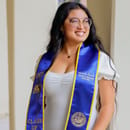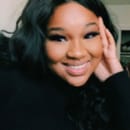The following article is an interview with one of our chapter’s very own graduating seniors, Ayanté Hardy. Ayanté is graduating from UCR with a degree in liberal studies and a plan to continue her education in graduate school for interior design. She is an inspiration to all the members of our chapter and I was lucky enough to have the following conversation with her about her college experiences and insight:
Q. How does it feel to be graduating during a pandemic? What positive/negative things came out of this experience?
A: I’m just excited overall to be graduating, to be honest. I was never in love with UCR so I’m really glad to be graduating. When the pandemic happened, it was at a time in my life where I wasn’t too concerned about the pandemic itself. My grandmother had passed at the very beginning of the year, last year, so by that time I didn’t really feel the effects of the pandemic like everyone else did because I was still in grief. Transitioning back to home was actually really good for me because I needed to be around my family and that support. I’m about 5 hours away from Riverside so I was always one of those people who didn’t get to go home very often. So, this was actually kind of a small blessing for me and I’m lucky I have a really supportive family. I never had any issues with noise or being able to focus, everyone’s at work so I’m home alone all day! I feel like I’m one of the few people who’ve handled the pandemic really well, the transition was easy for me. One positive was that being home and not going out forced me to really focus on school and finish up strong. And then when I decided that I wanted to pursue grad school, I was like, this is a good opportunity to take it seriously and it paid off!
Q: When did you know your major was right for you? Was it always your major or did you change it at one point?
A: When I first applied to UCR, I think it was for African American studies because I really didn’t know what I wanted to do. Right before college, when I was still in high school, I wanted to be a cosmetologist and become a makeup artist. So, I really had no direction right. I also wanted to be a teacher for a really long time and, I thought, maybe a professor. Then, I wanted to learn ethnic studies because I figured I’d be an ethnic studies professor. Before school even started I switched to liberal studies. Actually, I’ve changed my major a lot because I was even in business at some point and I switched to liberal studies after that. I really love the major. One thing about liberal studies is our program is really small so we don’t have upper division classes like the other majors. We only have one specific liberal studies capstone class and I didn’t take that until two quarters ago. So, we get to benefit from other disciplines. I’ve taken a lot of gener sexuality, sociology, anthropology, and all those types of classes because we don’t really have our own strong discipline but we get to take from all the others and have a more holistic view of how to communicate with people and understand people. I think it is the right major for me because it’s helped me. The people who reviewed my grad school application and got to know me said like, even though I wasn’t a design major coming into the program, having this liberal studies background is actually advantageous to me because it makes me approach design differently. I have an understanding of the clients before the design, whereas most designers understand what they’re building before they understand their people.
Q: What is one way you feel like you’ve grown since your freshman year?
A: Oh man, I feel like I’ve grown a lot since freshman year. Coming into college, you have all these questions and panic about every little thing. That adjustment in the first year can be really hard. I would say socially, I’ve grown a lot. I’ve always been an extrovert like it’s not hard for me to talk or make friends, but it is hard for me to keep friends. So, I went through a lot of transition periods where I outgrew friends and they outgrew me. Having to refocus my priorities was something that I really learned since freshman year. Freshman year I did really bad, I was on academic probation because coming into college was the first time I’d ever been to a party. And once I got a taste of that, I kept going out with friends and ignoring my studies. That’s been my biggest change since freshman year: prioritizing my schoolwork and having to compromise my social life so I can do well in school. And then, too, as I went on, I got more comfortable reaching out to my professors. I like to get to know them on a personal level. I go to office hours and like to share life stories to pick their brains. The most important thing is to remember what you came here for.
Q: What is one thing you would like to tell your freshman self?
A: I would tell myself, “stay true to yourself.” Because college really is the time where you try to find yourself, especially if you go away for school, and nobody knows you so you can be anybody you want to be. But I feel like I should have stayed more true to myself and what I believed in because I felt like I compromised a lot of the things that I wanted to do or I thought for the sake of going with the friend group I was hanging out with. Like, sometimes I had different interests or like different things and it seemed like I was giving up too much of the things that I wanted to do for their sake but no one was doing the same for me. And of course it bothered me when I noticed it but I didn’t want to be alone. I didn’t know how to. And I think that’s actually the biggest thing I’ve learned. I love my solitude. I love being by myself. Now, I have to work to let people come back in and join me but I learned to love my own company. I enjoy doing things by myself. So what I would tell myself is “you’re going to be okay and what seems like a mountain now, is really just an anthill.” When you scale back and look at the grand scheme of things, something that seems like a major deal is not going to matter all that much.
Q: When were you at your most stressed in college and how did you relax or unwind?
A: Every time it was finals week! I feel like when I got a job on campus and started working because I had never had to balance a job and school like that before. I had other jobs but they didn’t take time away from me because they were in the summer. So that was my first time balancing them both. There’s so many assignments that you have to do for school and that’s it’s own set of stress but then if you have to go to a job that you don’t like, it makes it so much worse. That was right around six months before the pandemic. In stressful situations, I called my mom. That was a running joke in freshman year because almost everything I said referred back to my mom. I could call her up to 13 times in one day, for everything. So, I would turn to my support system who I knew would hear me out or give me suggestions. Or I would write it out through poetry.
Q: Have you always had that self-awareness to know when you need help and when to ask for it?
A: That’s a good question, I think that definitely comes with maturity and age. I was a very angry kid just because of stuff that went on at home so for a long time, I kept a lot of stuff to myself and anytime I felt something it would be rage. But then I figured it’s okay to share these things and unlearn these behaviors. That came with age, around sixteen. I credit that a lot to Tumblr, surprisingly, because I learned so much on there about things like cultural appropriation or other important things I care about now. I learned online by talking to people who had no bias. It opened me up to a world that I don’t think I would have figured out otherwise. So, I credit a lot of how I’m able to speak up now to that journey in my life. I try not to keep anything in now because that doesn’t help me.
Q: Has the pandemic created any setback to or benefits for your mental health?
A: The good thing about the pandemic and being home was that when it was good, it was good. But when it wasn’t, it wasn’t and then you’re stuck with these people and I’d think, I wanna go back to campus. It forces you to deal with stuff that you don’t wanna deal with. So, I definitely had low points during the pandemic but not as many as I know other people have. And it wasn’t all horrible, I can’t say that. I feel like I’ve been privileged in that sense. When I had lows, it was mostly non-pandemic related stuff. I try not to dwell on the negative too. Here’s how I handle negative stuff: I either talk it out or cry and get over it. Sometimes you just need to let yourself cry then go about your day. I’m pro-cry!
Q: Looking back, do you have a favorite memory of college?
A: The parties. I remember the general feelings of all the parties and some crazy things that happened with my friends. Even if I’m not friends with those people anymore, I still have the memories and think they were funny. But in general, the professors. I don’t think I’ll ever forget the professors that I’ve genuinely connected with. I’m a really emotional person so I’ve cried and had heart-to-hearts with professors. It’s like we forget their people too sometimes. I’ve met some really impactful professors and that’s my general takeaway from college. Great professors here. Not all of them, but there were so many that really matter to me. And I’ll remember the talks we had, the advice and support they gave me. When you connect with a professor, it can also open up opportunities for you. Like if they know what you’re going through they might be more lenient with deadlines and stuff so I always encourage people to really get to know them. Be that one student who does.
Q: What are your plans for the near or far future and which are you most excited for?
A: Well, immediate excitement is right after virtual graduation, I’ll be going on a graduation trip with my mom and sister to San Francisco! And I have some preparatory work to get done before grad school, some online softwares I have to learn how to use. But enjoying my summer in general is what I’m immediately excited about. In the near future, I am going to grad school for interior design because I want to be an interior designer. My ultimate goal is, because I support the Equitable Shelter Movement, to create housing that brings luxury living to low-income families. I draw from my own experiences and where I grew up, there was always a nice part of the city then the not-so-nice part that I was usually from. And I know a lot of black and brown families relate to that. It’s like, why do you have to have a large amount of income to live in a penthouse style apartment? Why can’t people who are on social security have that? All the people who really need it shouldn’t have to break the bank or struggle to make ends meet. They already have to pay bills and I don’t want to add onto that. So, I want to make sure I get people off the street and put them somewhere nice. That’s what I want to do with my design practice. Also, I want to buy property. I want to re-establish black towns because historically we’ve had black towns but they were burned down by white supremacists. I really like residential stuff and would also love to work with a really nice resort hotel.
Q: How do you see the happiest version of yourself in the future?
A: Far from now—I’m not going to say I “want” to be— I’m going to be wealthy. I want to be able to travel to Iceland, Thailand, Greece, and New York. I really want to be financially stable so I don’t have to worry about breaking the bank for one trip. I don’t have any dogs right now but I want some. I want to have a hand in my future home, in designing it, because I’ll have the skillset and I have the eye for it already. I’d love to decorate my own home. And I want to pay off my loans!
Q: Did you always know you wanted to go into interior design?
A: I feel like yes and no. It was something I was always interested in and had a passion for but I didn’t think I could do it. I didn’t know what it took to become an interior designer and I never expected that it was welcoming to people of all backgrounds academically so I didn’t look into it. It wasn’t until last summer that I decided I wanted to go to grad school. Liberal studies is so broad that I didn’t know what I was going to do so I asked myself, “what are you passionate about?” Because I think it’s important to keep your hobbies and passions separate. So, writing and poetry is a hobby for me but I was passionate about architecture and interior design. And then I got to work building my entire portfolio in quarantine. I did all this by myself. It was hard, I had a couple breakdowns and thought I wasn’t going to finish the application but I stayed on top of what I needed to do because I wanted to at least give it a try. I think the most important takeaway from that experience of figuring out what I wanted to do was that right when I finished my portfolio and submitted it, I felt so much relief. I thought, whether I get in or not I am proud of what I did.
Q: Did you experience any impostor syndrome going into a career that didn’t match your major? How did you deal with it?
A: I’ve felt that all the time. Maybe it’s a little bit of my ego but I felt entitled to this experience. I feel like you have to think to yourself, “why shouldn’t I get in?” But it’s important to back up that feeling too. Even when I did have that impostor syndrome, it was easily diminished when I got in touch with the faculty. Before I submitted, one of the faculty members I was talking to told me that I had a promising future with the school and she asked me, “if you didn’t get in, would you apply again?” And I had to think about that because I was so used to trying once then giving up but she brought it to my attention that I should keep going for it even if I don’t get in the first time because I want it. So if I was worried about pursuing something but the people in charge of it were telling me “that’s not a reason you shouldn’t do it” then why let myself still stay in my head about it when they were telling me that I have just as good of a chance as anyone else. And so I went for it. It’s okay to dwell on it for a second but I still have to figure it out so might as well try this and see how it goes.
Q: What is your takeaway from Her Campus and some advice you’d like to leave for the remaining chapter members?
A: See, now that makes me sad. I don’t really want to leave Her Campus! Hopefully, I’ll still be around and I’m always available to you all. It’s the first club I really stuck to so I think the whole thing was a fun takeaway. One thing I got was friends because I really love all you girls. Even if we don’t talk all the time, it’s fun to see everyone’s articles or their posts and just connect in those little interactions, especially during quarantine. The advice I would have for you all is to really get in touch with the world and yourself when you’re trying to figure out things to write. It’s good to get personal with your writing because you could be speaking directly to a reader. Talk about your experiences and things within your own community, fandoms, intersections, etc. in a way that you feel hasn’t been talked about yet. Because no one’s going to know more about it than you! And it might resonate with someone else.



